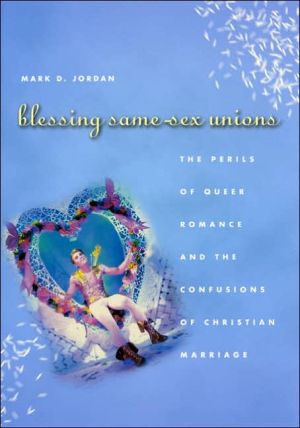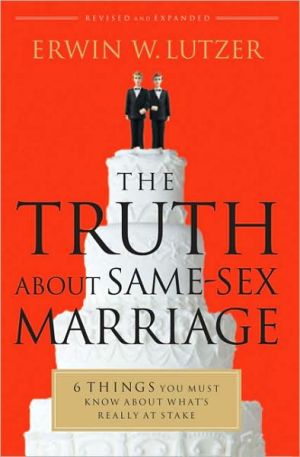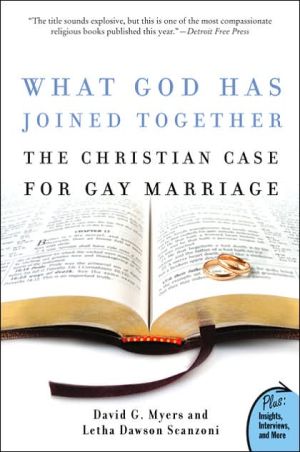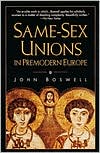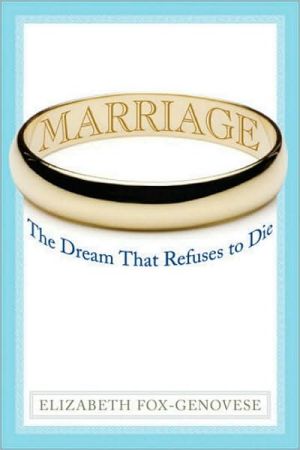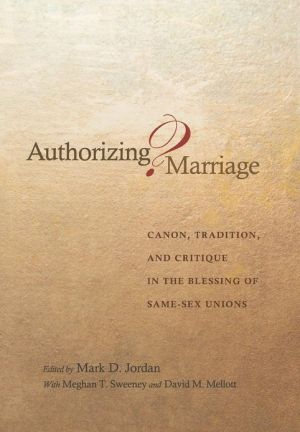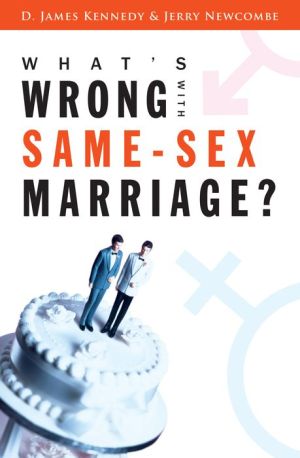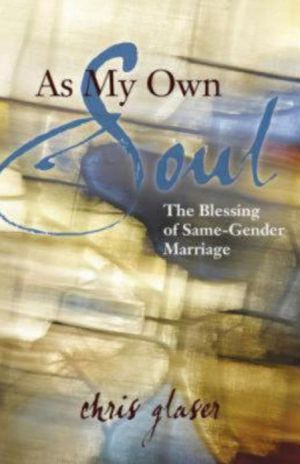Blessing Same-Sex Unions: The Perils of Queer Romance and the Confusions of Christian Marriage
At most church weddings, the person presiding over the ritual is not a priest or a pastor, but the wedding planner, followed by the photographer, the florist, and the caterer. And in this day and age, more wedding theology is supplied by Modern Bride magazine or reality television than by any of the Christian treatises on holy matrimony. Indeed, church weddings have strayed long and far from distinctly Christian aspirations. The costumes and gestures might still be right, but the intentions...
Search in google:
At most church weddings, the person presiding over the ritual is not a priest or a pastor, but the wedding planner, followed by the photographer, the florist, and the caterer. And in this day and age, more wedding theology is supplied by Modern Bride magazine or reality television than by any of the Christian treatises on holy matrimony. Indeed, church weddings have strayed long and far from distinctly Christian aspirations. The costumes and gestures might still be right, but the intentions are hardly religious.Why then, asks noted gay commentator Mark D. Jordan, are so many churches vehemently opposed to blessing same-sex unions? In this incisive work, Jordan shows how carefully selected ideals of Christian marriage have come to dominate recent debates over same-sex unions. Opponents of gay marriage, he reveals, too often confuse simplified ideals of matrimony with historical facts. They suppose, for instance, that there has been a stable Christian tradition of marriage across millennia, when in reality Christians have quarreled among themselves for centuries about even the most basic elements of marital theology, authorizing experiments like polygamy and divorce. Jordan also argues that no matter what the courts do, Christian churches will have to decide for themselves whether to bless same-sex unions. No civil compromise can settle the religious questions surrounding gay marriage. And queer Christians, he contends, will have to discover for themselves what they really want out of marriage. If they are not just after legal recognition as a couple or a place at the social table, do they really seek the blessing of God? Or just the garish melodrama of awhite wedding? Posing trenchant questions such as these, Blessing Same-Sex Unions will be a must-read for both sides of the debate over gay marriage in America today. Publishers Weekly Emory University religion professor Jordan writes not just a powerful, at times brilliant, brief for Christian churches' blessing same-sex unions-though it is that. It is also a primer in recent queer theory and a critique of contemporary America's wedding industry. Jordan traces the history of Christian thought about marriage (rehearsing some of the ground he covered in The Ethics of Sex) and insists that there is no fixed, transhistorical Christian ideal of marriage. Since the early church only grudgingly allowed Christians to marry, same-sex unions may be no more a departure from previous Christian understandings of marriage than today's enthusiastic endorsement of heterosexual marriage is. The most innovative chapter examines engagement and asks whether gay couples can, or should, be engaged; here Jordan offers close readings of narratives about gay unions from 1951 (before Stonewall) and 1979 (after Stonewall, but before AIDS). Unfortunately, the book can be so jargon-laden that it is at times almost impenetrable: in just one paragraph, the reader will stumble over "My performance encounters the dichotomy male/female in its doubled or squared version" and "the presumptively universal essence of one polarized gender." Decoding the academese is rough going, but worth the effort. This is not merely a contribution to gay studies; any Christian who wants to think more clearly about marriage should read Jordan. (June) Copyright 2005 Reed Business Information.
Introduction : uncivil ceremonies11Some boys' romance232A proper engagement503Your (?) special day794Finding some marriage theology - before the ceremony1005The wedding and its attendants1286Afterward; or, out of bounds1567Ending in time185Epilogue : a comic exhortation206
\ Christian Century - Craig L. Nessen\ “Documenting his case colorfully from both popular media and scholarly sources, [Jordan] askes: If all that marriage entails is followinbg the etiquette advice from a professional wedding planer, what is the point? Jordan digs deep as he examines the historical and theological origins of Christian marriage.”\ \ \ \ \ Gay & Lesbian Review - Daniel A. Burr\ "Blessing Same Sex Union is an impressive disply of learning and a clear warning against the dangers of mass marketing and the false certainty so characteristic of the Christian right."\ \ \ Virginia Quarterly Review"A thoughtful and provocatively sustained analysis of gay marriage, Jordan's book will undoubtedly cost him a few friends."\ \ \ \ \ H-Net Book Review"Jordan's brilliant reading of logic within current debates of history, Christian theology, and contemporary wedding culture effectively challenges what many hold to be true about 'blessing same-sex unions'. . . . One of the great strengths of this examination is Jordan's . . . ability to point to the odd and somethimes surprising confluence of commercialism, homophobia, Christian theology, state power, and sexism (to name just a few) embedded in so many of the contemporary discourses of gay marriage."\ \ \ \ \ INTAMS"For this straight Christian, the honest insights into gays' own understanding of their unions, and the mingling of these with insights of deep faith and love, made for a compelling read. This comedy of manners deserves to be taken seriously."\ \ \ \ \ Publishers WeeklyEmory University religion professor Jordan writes not just a powerful, at times brilliant, brief for Christian churches' blessing same-sex unions-though it is that. It is also a primer in recent queer theory and a critique of contemporary America's wedding industry. Jordan traces the history of Christian thought about marriage (rehearsing some of the ground he covered in The Ethics of Sex) and insists that there is no fixed, transhistorical Christian ideal of marriage. Since the early church only grudgingly allowed Christians to marry, same-sex unions may be no more a departure from previous Christian understandings of marriage than today's enthusiastic endorsement of heterosexual marriage is. The most innovative chapter examines engagement and asks whether gay couples can, or should, be engaged; here Jordan offers close readings of narratives about gay unions from 1951 (before Stonewall) and 1979 (after Stonewall, but before AIDS). Unfortunately, the book can be so jargon-laden that it is at times almost impenetrable: in just one paragraph, the reader will stumble over "My performance encounters the dichotomy male/female in its doubled or squared version" and "the presumptively universal essence of one polarized gender." Decoding the academese is rough going, but worth the effort. This is not merely a contribution to gay studies; any Christian who wants to think more clearly about marriage should read Jordan. (June) Copyright 2005 Reed Business Information.\ \
